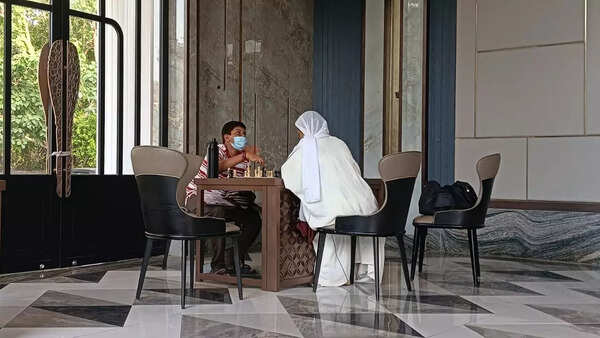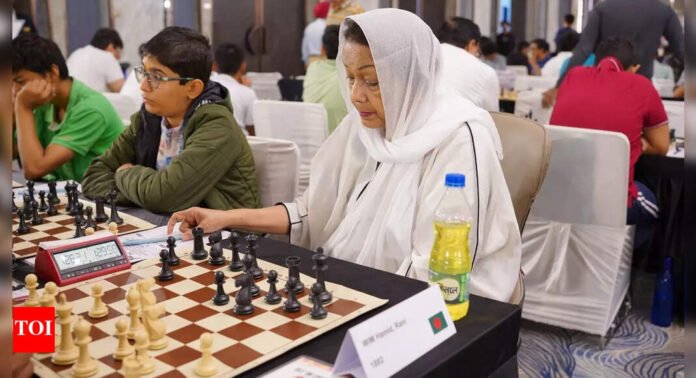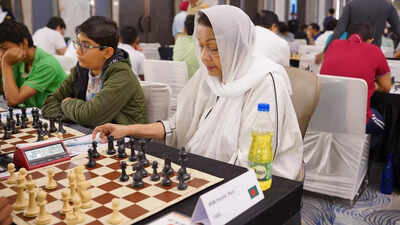NEW DELHI: Balaji Sudarshan is a 2012-born chess prodigy from Tamil Nadu who was up against 80-year-old Bangladeshi legend Rani Hamid in round 6 of the Delhi International GM Open Chess Tournament 2025.Going into the game, Hamid had suffered three losses, all against lower-rated opponents in the first five rounds, and that, perhaps, played a part in the Woman International Master (WIM) arriving at the playing hall five minutes late for the scheduled start of 4pm IST.Carrying her familiar orange-coloured juice in a plastic bottle, a habit she has followed throughout the tournament, Hamid first quietly deposited her belongings, including her bags and mobile phone, at the volunteer’s desk.

The deposit desk (Photo credit: Special arrangement)
Go Beyond The Boundary with our YouTube channel. SUBSCRIBE NOW!With steady eyes and the absolute calm of experience, she entered the playing hall, bottle in hand, determined to change the course of her campaign. But little did she know that the 13-year-old across the board had enough answers to her questions on the 64 squares.Within the next hour-and-a-half, Hamid, the first Bangladeshi to earn the WIM title, was back at the volunteer’s desk, gathering her belongings. Accompanying her was a young Sudarshan.Noticing the curious glances from volunteers, Hamid, born as Sayeda Jasimunnessa Khatun, offered a warm smile and said, “He has played really well. I want to analyse games with him.”Outside the playing hall, three tables were set up with chessboards. It was here that the octogenarian legend and the teenage talent sat down, chess pieces between them, as equals, as friends, speaking the language of the game.

Rani Hamid analyzing game with young Balaji Sudarshan (Photo Credit: Special arrangement)
For the next 45 minutes, they discussed moves and ideas, their age gap bridged by their shared love for chess. As Hamid herself put it, “I don’t try to teach or show off to anyone. I play for the joy of it, I enjoy it. I believe we should do whatever brings us happiness, don’t you think?” (laughs)This isn’t Hamid’s first visit to Delhi for chess. In fact, her association with the capital goes back nearly five decades. “I first came here for a tournament when Fakhruddin Ali Ahmed was President of India,” she recalled, referring to the period between 1974 and 1977.
Early years of Viswanathan Anand
Among the memories etched in her mind from those early tournaments is one involving a young Viswanathan Anand, long before he became a household name.“Anand, at that time, wouldn’t usually spend more than five minutes on anyone. He’d make his move quickly, get up, and walk around while your clock ran. But against me, he didn’t get up from his chair for half an hour. Can you believe it? I waited half an hour before making my move, and as soon as I moved, I left the board,” Hamid told TimesofIndia.com.“His mother was pacing nervously. I told her, ‘Don’t worry, I’ve made a bad move. Your son is winning now.’ I had actually launched a really good attack, but he sacrificed his rook, defended, and then promoted a pawn to queen. I didn’t even see it coming. I wasn’t that good at the game!”
‘Mojar Khela Daba’
Hamid’s path into chess was never part of a grand plan. Chess evolved in her life from a family pastime to a national legacy.Growing up in a sports-oriented family, with a father who excelled in various games, including chess, and later marrying a supportive, sports-loving army officer, Rani was always surrounded by encouragement.While she modestly claims she only focused on playing, her consistent success, winning the Bangladesh national championship 20 times and the British Chess Championship three times, turned her into an inspiration.
Her late husband MA Hamid, deeply involved in promoting sports, pushed her to write “Mojar Khela Daba” (The Fun Game: Chess), a guide that became widely popular, especially in Kolkata.“Whenever I’d go to Kolkata for tournaments, the coaches would ask me to bring copies of the book because it helped them teach. I tried to write it in a style that was easy to follow, almost like grammar lessons. In the beginning, it explained how to write moves, what to do because players would come from villages and small towns, and they didn’t know how to notate their games. None of us knew! In the villages, they’d just play for fun,” She explained.“I was actually really lucky. The Bangladesh champion back then was my neighbour; he was married to my classmate’s elder sister. Playing with him helped me improve quickly… People say I’m 80, but I started playing when I was 33. I never played to gain anything. If I’d known chess could give so much, maybe I’d have taken it more seriously, prepared better, tried for the GM title. But I didn’t do any of that. You can’t become a GM playing one tournament a year!”
India’s Khadilkar sisters
With the Bangladesh Chess Federation joining FIDE in 1979, her first major exposure on the international stage came at the 1981 Asian Women’s Championship in Hyderabad. Hamid was untested on such platforms.“Before that, we hardly had any international exposure. I went to Hyderabad with no expectations. Niaz Murshed, the first South Asian Grandmaster, told my companion, ‘You might get 1-2 points, but the lady going with you will get nothing,’” she recounted.“Back then, women’s chess in India was led by the Khadilkar sisters: Jayshree, Vasanti, and Rohini. Two of them had already become WIMs, so they wanted the youngest to get the title too… But when I went and won 6 rounds, Rohini’s coach got nervous. I had a match against her in the next round. He even came up to me to ask if I had read the latest Informant (a chess publication). I didn’t even know what that was! I tried to avoid his questions, but he kept asking until I finally gave up, ‘What is this latest Informant?’ That was the level of our preparation; I just played for the love of it.“
‘If Bangladesh had chess tournaments, why would I come to India?’
Despite individual flashes of brilliance, Hamid is honest about the challenges that have held back chess in her country, admitting, “Bangladesh hasn’t progressed in chess the way India has because we don’t have strong organisers. We lack good guidance, and everyone wants to sponsor football or cricket. The economic challenges are real. But above all, the weakness in the organisation has hurt us the most. There aren’t any tournaments. If there were, why would I come all the way here to play? But the DCA (Delhi Chess Association) invited me, arranged tickets, food, I’m grateful.”ALSO READ: ‘Earlier, I used to beat Indians at will’: What global chess stars in their 30s, 50s, and 80s say about India’s dominanceHamid, mother of one daughter and three sons, smiles when reminded of past victories that surprised even her. “I beat the U18 World Champion once, and I also beat the world No. 3 at one point. That created quite a stir. But neither the federation nor I ever planned anything for my chess career, so it never became something bigger”When enquired about future plans, she would take a sip from her bottle and said: “I live in the future now!” (laughs)



